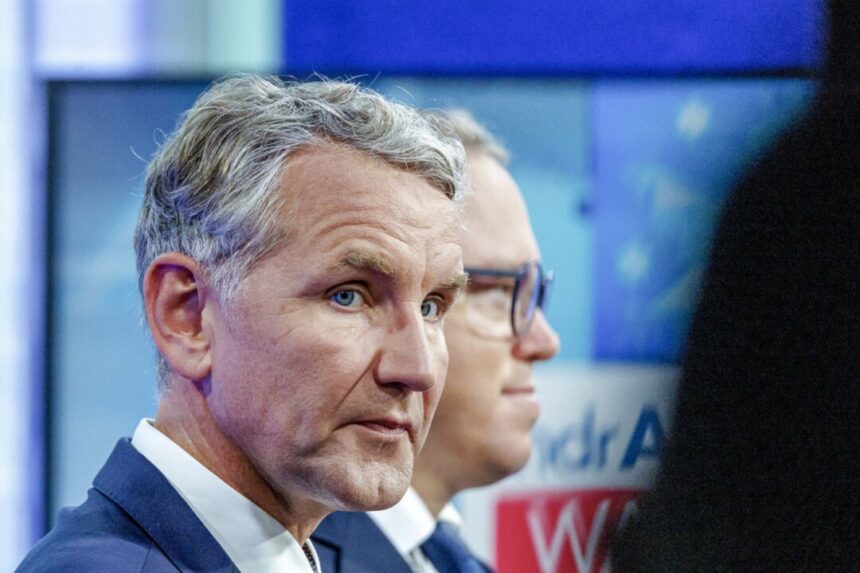The eastern branches of the party are the most right-wing, where they achieved victory in state elections, reflecting broader political trends that often originate in this region, as noted by analysts.
The populist Alternative for Germany (AfD) has made significant strides in state elections, establishing itself as a dominant force in eastern Germany and signaling a potential shift in the country’s political landscape. While many view this win as the first instance of a far-right party securing a state election in Germany since the Nazi era, questions remain about the accuracy of this narrative. Some speculate that AfD’s success highlights the neglect of common worker concerns, particularly regarding immigration, by the political mainstream. This victory raises important questions about the future of German politics.
Analysts suggest that AfD’s unprecedented success is reshaping the political future of Germany, disrupting the existing mainstream and paving the way for new political ideologies to gain traction. This shift includes the rise of a left-conservative, anti-establishment, anti-immigration party.
The recent results have placed AfD in a powerful position to influence national debates, a prospect that was unimaginable just a few years ago. The party’s leader in Thuringia, Björn Höcke, hailed the election outcome as a historic victory, signaling a clear message to the political elite in Berlin. The party’s success has positioned them to shape future political discourse and policy decisions.
The AfD’s growing influence in eastern Germany is seen as a sign of changing political trends, with the region often leading the way in these shifts. This success has granted AfD a significant negotiating position, with the ability to influence key decisions at the federal level.
As AfD continues to make waves, questions arise about the party’s stance on controversial issues such as immigration and adherence to Germany’s strict speech laws. Despite facing scrutiny for his remarks, Höcke remains a polarizing figure within the party, pushing the boundaries of acceptable discourse.
Overall, AfD’s rise reflects a broader discontent with mainstream parties and a shift towards more conservative and anti-establishment ideologies. The party’s success in state elections has significant implications for German politics, signaling a potential realignment of political forces in the country. In March, the Young Alternative Thuringia of the AfD was labeled as “right-wing extremist” by Germany’s Federal Office for the Protection of the Constitution. The office noted that the party’s ethno-cultural concept of the nation contradicts the broader understanding enshrined in Germany’s constitution. However, not all party members support these extremist tendencies.
The AfD’s policies cover a range of issues, including anti-immigration views, opposition to the Ukraine war, skepticism about climate change policies, and critiques of EU integration. The party’s leaders advocate for strict border controls, a reduction in asylum seekers, and the preservation of traditional German culture, stating that “Islam does not belong to Germany.”
The party’s rise can be traced back to Germany’s handling of the 2015 migrant crisis, which led to a backlash among many citizens. This growing skepticism towards immigrants has intensified in response to high-profile crimes committed by non-German citizens.
Chancellor Olaf Scholz’s liberal-left coalition has faced criticism for its handling of various issues, leading many Germans to believe that the AfD offers more effective solutions. However, Scholz has called on other parties to prevent the AfD from governing, urging them to form stable governments without right-wing extremists.
Writer Thomas Fazi warned that the AfD’s success has disrupted Germany’s political mainstream, leading to the rise of new parties like the Sahra Wagenknecht Alliance. This left-wing nationalist party combines left-leaning economics with conservative migration policies and opposition to the Ukraine war.
Fazi believes that Germany’s ruling coalition is unlikely to change course, potentially leading to a more authoritarian approach. He also highlighted the global transatlantic establishment’s influence on German politics, emphasizing the importance of parties like the Sahra Wagenknecht Alliance in addressing the material concerns of the population.

Fazi suggests that a populist synthesis, such as Wagenknecht’s, has great potential as it redefines the concepts of “security” and “conservatism” in a more comprehensive way compared to most right-populist parties.
Instead of solely focusing on public safety like street security and crime reduction, Wagenknecht’s approach also puts emphasis on economic security by implementing interventionist policies that support labor and welfare, according to Fazi.
Left-populism addresses national security by challenging aggressive militarism and nuclear threats, particularly in the context of NATO, which has become increasingly relevant, he added.
Reuters contributed to this report.
Please rewrite this sentence for me.
Source link





